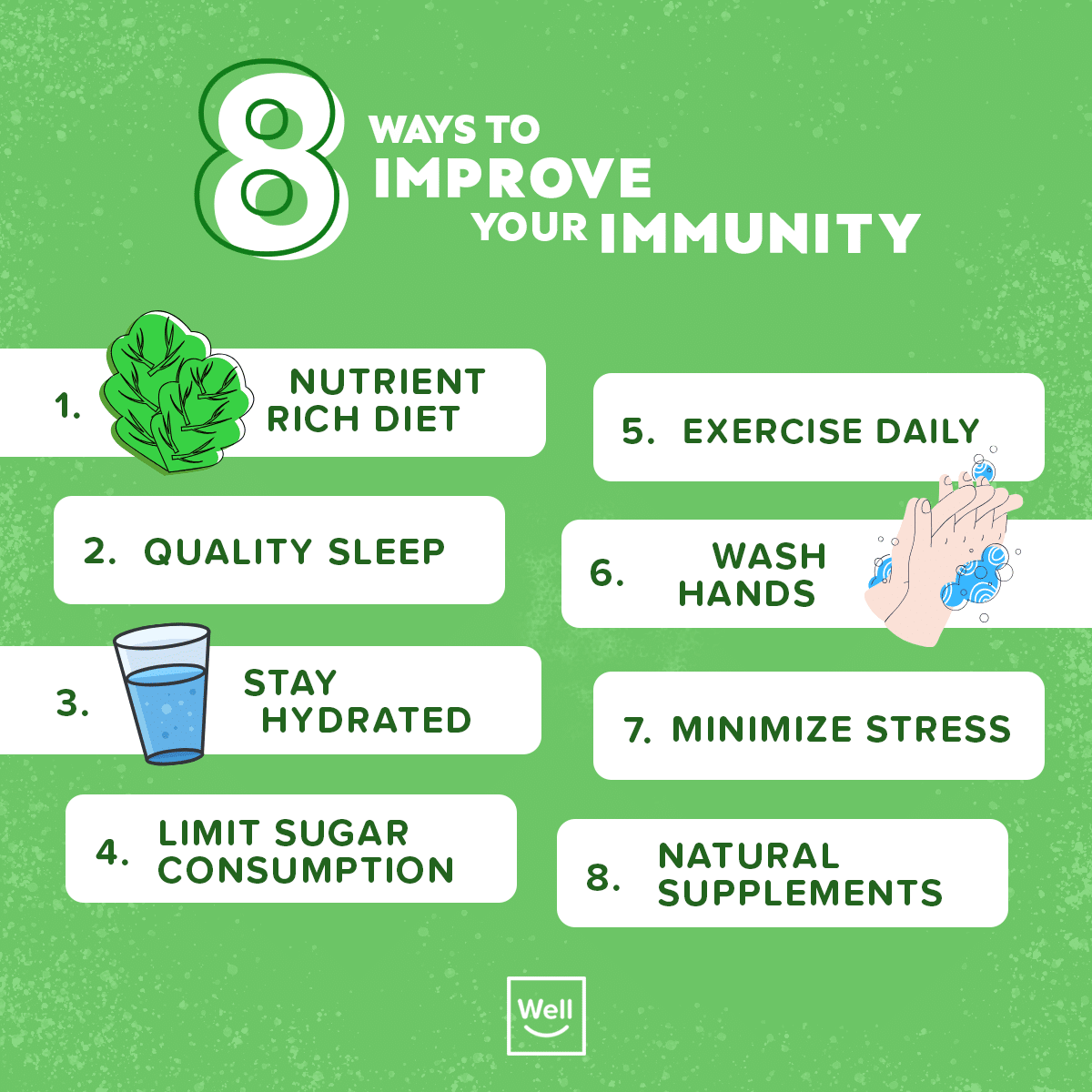
8 Ways to Improve Your Immune System
During the Coronavirus Pandemic
You can help boost your immune system during the Coronavirus pandemic
by making some key modifications and reducing overall risk factors.

Our bodies are designed to look out for us! Our Immune system is made up of cells, organs, and chemicals which all help to protect against infection and disease, as well as recovery.
When our bodies experience infection (from a virus, for example) a fever is our immune system responding to the foreign invaders and initiating the “repair” process. It works diligently to keep these invaders out as well as find and destroy them.
While our immune system can’t cure infections and diseases alone, it does play a significant and vital role in recovery and survival! Lifestyle changes, as well as dietary choices, may help to strengthen this defense system and fight off foreign organisms.
Below are 8 recommendations we have to help keep your immune systems working at full capacity!
1. Focus on a nutrient-rich diet
A balanced, nutrient-rich diet is key to help defend our bodies against sickness. Fruits and vegetables are full of antioxidants that help to stimulate and activate the T-cells which help to activate immune cells to fight infection. Vegetables are also filled with essential vitamins and minerals.
2. Get plenty of quality sleep
Like nutrient-rich foods, quality sleep (6-7 hours) helps keep the T-cells active. So if you need another reason to sleep-in, here’s one!
Of course, there are times where our bodies may become extremely sleep deprived. Stressors, bad diet, depression, and many other factors can be extremely disruptive to our natural wake-sleep cycle. If you’re having trouble sleeping, try pinpointing what’s causing your unrest and work on eliminating them one by one.
3. Stay Hydrated
We could spend all day talking about how important water is for many different reasons. But as it relates to the immune system, water is necessary for carrying oxygen to organs, cells, and tissues. Water also helps to remove toxins from the body and prevent toxin build-up.
To calculate how much water you should drink daily, divide your weight (in pounds) by 2. That number is how much you should drink in ounces.
4. Limit sugar consumption
Most people know that an excess of sugar in their diet is going to create many complications. Sugar affects the cells in your immune system, including our white blood cells which are responsible for attacking bad bacteria in our bodies.
There are many other complications that arise from excess sugar consumption so the best thing you can do for yourself and your immune system is to limit is as much as possible.
5. Exercise daily (outside if possible)
Like drinking water, most people know that exercise benefits them for many reasons. Exercise activates the sympathetic nervous system which is responsible for releasing hormones epinephrine and norepinephrine that activate our immune cells.
It’s important to understand that daily exercise does not have to be extreme in order to reap the benefits. Moderate exercise, such as a 20-minute walk is very effective and not to mention feels great!
6. Wash your hands thoroughly
Washing your hands is one of the most effective ways to keep germs from spreading. Some viruses can live on surfaces for hours-some even days. Washing your hands throughout the day can help keep the germs from getting inside of your body.
The golden rule for washing hands is to wet your hands with soapy water and lather for at least 20 seconds. Be sure to lather your wrists, in between each finger, and even under your fingernails. After 20 seconds, rinse your hands thoroughly and then dry with a clean paper towel or hand towel.
7. Minimize stress
This might sound easier said than done as most of us experience stress in our lives and for some, on a daily basis.
But when we are chronically stressed (research shows some stress is actually good for the body) our body sends defense signals that trigger hormones such as cortisol. Increased levels of cortisol in the body will negatively affect the immune system by decreasing the level of white blood cells (which help the body fight infection/foreign invaders). These changes combined will overall decrease our body's resistance to colds and viruses.
Minimizing stress is going to help keep your immune system running smoothly. Start by incorporating different methods into your daily routine such as meditation, deep breathing, taking short work-breaks throughout the day or when necessary, find a therapy group or counselor to talk about your stressors.
8. Natural Supplements
An important note: There is no one supplement that can cure or prevent any disease. But supplements can help improve immunity. Certain compounds in supplements, especially vitamins, play a big role in your metabolism and maintenance of the body's immune defenses.
Some supplements may not be appropriate for certain health conditions, so be sure to talk with your healthcare provider before starting a supplement routine of any kind.
If you are interested in knowing more about the benefits of chiropractic care or whether or not it is the right treatment for you, schedule your New Patient Special!
Recommended ARTICLES






8 Ways to Improve Your Immune System During the Coronavirus Pandemic
You can help boost your immune system during the Coronavirus pandemic by making some key modifications and reducing overall risk factors.

Our bodies are designed to look out for us! Our Immune system is made up of cells, organs, and chemicals which all help to protect against infection and disease, as well as recovery.
When our bodies experience infection (from a virus, for example) a fever is our immune system responding to the foreign invaders and initiating the “repair” process. It works diligently to keep these invaders out as well as find and destroy them.
While our immune system can’t cure infections and diseases alone, it does play a significant and vital role in recovery and survival! Lifestyle changes, as well as dietary choices, may help to strengthen this defense system and fight off foreign organisms.
Below are 8 recommendations we have to help keep your immune systems working at full capacity!
1. Focus on a nutrient-rich diet
A balanced, nutrient-rich diet is key to help defend our bodies against sickness. Fruits and vegetables are full of antioxidants that help to stimulate and activate the T-cells which help to activate immune cells to fight infection. Vegetables are also filled with essential vitamins and minerals.
2. Get plenty of quality sleep
Like nutrient-rich foods, quality sleep (6-7 hours) helps keep the T-cells active. So if you need another reason to sleep-in, here’s one!
Of course, there are times where our bodies may become extremely sleep deprived. Stressors, bad diet, depression, and many other factors can be extremely disruptive to our natural wake-sleep cycle. If you’re having trouble sleeping, try pinpointing what’s causing your unrest and work on eliminating them one by one.
3. Stay Hydrated
We could spend all day talking about how important water is for many different reasons. But as it relates to the immune system, water is necessary for carrying oxygen to organs, cells, and tissues. Water also helps to remove toxins from the body and prevent toxin build-up.
To calculate how much water you should drink daily, divide your weight (in pounds) by 2. That number is how much you should drink in ounces.
4. Limit sugar consumption
Most people know that an excess of sugar in their diet is going to create many complications. Sugar affects the cells in your immune system, including our white blood cells which are responsible for attacking bad bacteria in our bodies.
There are many other complications that arise from excess sugar consumption so the best thing you can do for yourself and your immune system is to limit is as much as possible.
5. Exercise daily (outside if possible)
Like drinking water, most people know that exercise benefits them for many reasons. Exercise activates the sympathetic nervous system which is responsible for releasing hormones epinephrine and norepinephrine that activate our immune cells.
It’s important to understand that daily exercise does not have to be extreme in order to reap the benefits. Moderate exercise, such as a 20-minute walk is very effective and not to mention feels great!
6. Wash your hands thoroughly
Washing your hands is one of the most effective ways to keep germs from spreading. Some viruses can live on surfaces for hours-some even days. Washing your hands throughout the day can help keep the germs from getting inside of your body.
The golden rule for washing hands is to wet your hands with soapy water and lather for at least 20 seconds. Be sure to lather your wrists, in between each finger, and even under your fingernails. After 20 seconds, rinse your hands thoroughly and then dry with a clean paper towel or hand towel.
7. Minimize stress
This might sound easier said than done as most of us experience stress in our lives and for some, on a daily basis.
But when we are chronically stressed (research shows some stress is actually good for the body) our body sends defense signals that trigger hormones such as cortisol. Increased levels of cortisol in the body will negatively affect the immune system by decreasing the level of white blood cells (which help the body fight infection/foreign invaders). These changes combined will overall decrease our body's resistance to colds and viruses.
Minimizing stress is going to help keep your immune system running smoothly. Start by incorporating different methods into your daily routine such as meditation, deep breathing, taking short work-breaks throughout the day or when necessary, find a therapy group or counselor to talk about your stressors.
8. Natural Supplements
An important note: There is no one supplement that can cure or prevent any disease. But supplements can help improve immunity. Certain compounds in supplements, especially vitamins, play a big role in your metabolism and maintenance of the body's immune defenses.
Some supplements may not be appropriate for certain health conditions, so be sure to talk with your healthcare provider before starting a supplement routine of any kind.

